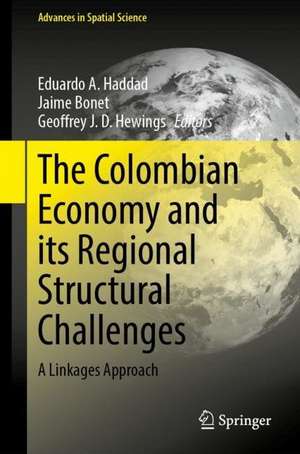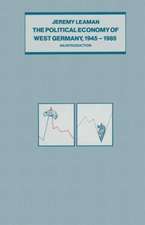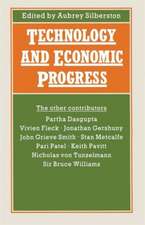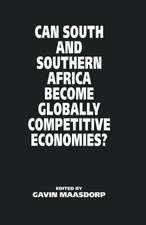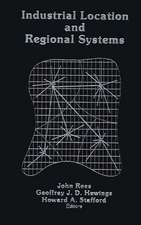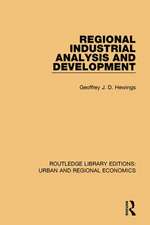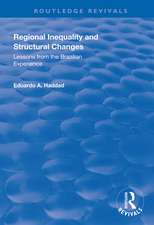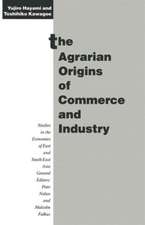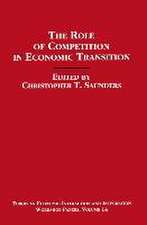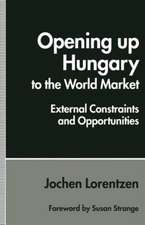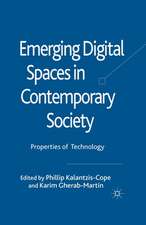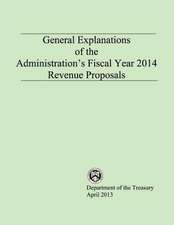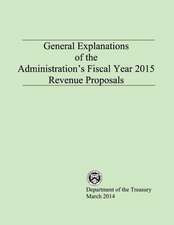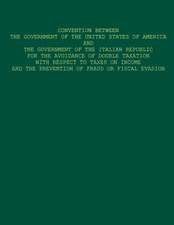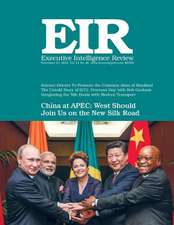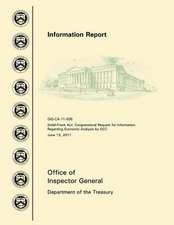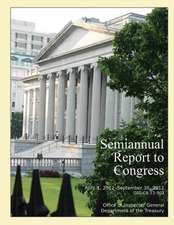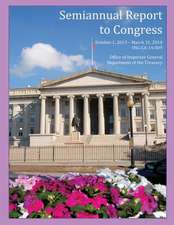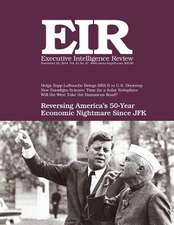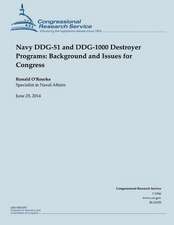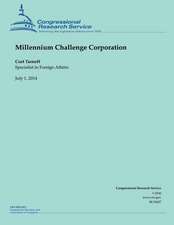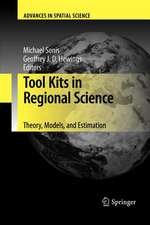The Colombian Economy and Its Regional Structural Challenges: A Linkages Approach: Advances in Spatial Science
Editat de Eduardo A. Haddad, Jaime Bonet, Geoffrey J. D. Hewingsen Limba Engleză Hardback – 29 apr 2023
The contributions, written by experts on Latin American economics and regional science, apply quantitative simulations based on a unified general equilibrium framework and address a wide range of topics, including: Colombia’s competitive integration in global markets, human capital profiles, regional economic disparities and public and private mechanisms of interregional income transfer. The challenges entailed by such high-profile and long-term issues as productivity growth and climate change are also analyzed.
In addition, the book positions Colombia’s experiences in an international comparative context. It argues that many other Latin American countries face similar challenges and provide evidence to substantiate this claim. By doing so, it offers valuable policy lessons for Latin American countries with similar difficulties.
Din seria Advances in Spatial Science
-
 Preț: 368.91 lei
Preț: 368.91 lei - 18%
 Preț: 963.47 lei
Preț: 963.47 lei - 18%
 Preț: 948.16 lei
Preț: 948.16 lei - 18%
 Preț: 947.67 lei
Preț: 947.67 lei - 18%
 Preț: 940.72 lei
Preț: 940.72 lei - 18%
 Preț: 954.45 lei
Preț: 954.45 lei - 15%
 Preț: 646.62 lei
Preț: 646.62 lei - 18%
 Preț: 959.50 lei
Preț: 959.50 lei - 18%
 Preț: 956.33 lei
Preț: 956.33 lei - 18%
 Preț: 949.23 lei
Preț: 949.23 lei - 15%
 Preț: 646.75 lei
Preț: 646.75 lei - 15%
 Preț: 643.99 lei
Preț: 643.99 lei - 18%
 Preț: 955.40 lei
Preț: 955.40 lei - 15%
 Preț: 643.00 lei
Preț: 643.00 lei - 15%
 Preț: 644.49 lei
Preț: 644.49 lei - 18%
 Preț: 953.35 lei
Preț: 953.35 lei - 18%
 Preț: 956.03 lei
Preț: 956.03 lei - 15%
 Preț: 647.27 lei
Preț: 647.27 lei - 15%
 Preț: 638.24 lei
Preț: 638.24 lei - 18%
 Preț: 961.23 lei
Preț: 961.23 lei - 18%
 Preț: 954.93 lei
Preț: 954.93 lei - 15%
 Preț: 643.48 lei
Preț: 643.48 lei - 18%
 Preț: 955.70 lei
Preț: 955.70 lei - 15%
 Preț: 650.86 lei
Preț: 650.86 lei - 15%
 Preț: 650.04 lei
Preț: 650.04 lei - 15%
 Preț: 648.42 lei
Preț: 648.42 lei - 18%
 Preț: 949.42 lei
Preț: 949.42 lei - 18%
 Preț: 960.30 lei
Preț: 960.30 lei - 18%
 Preț: 948.29 lei
Preț: 948.29 lei - 18%
 Preț: 958.07 lei
Preț: 958.07 lei - 18%
 Preț: 950.66 lei
Preț: 950.66 lei - 18%
 Preț: 956.03 lei
Preț: 956.03 lei - 15%
 Preț: 643.65 lei
Preț: 643.65 lei - 18%
 Preț: 956.99 lei
Preț: 956.99 lei - 18%
 Preț: 956.81 lei
Preț: 956.81 lei - 18%
 Preț: 958.73 lei
Preț: 958.73 lei - 18%
 Preț: 959.98 lei
Preț: 959.98 lei - 18%
 Preț: 952.40 lei
Preț: 952.40 lei - 15%
 Preț: 643.00 lei
Preț: 643.00 lei
Preț: 1123.35 lei
Preț vechi: 1369.95 lei
-18% Nou
Puncte Express: 1685
Preț estimativ în valută:
214.98€ • 222.09$ • 178.92£
214.98€ • 222.09$ • 178.92£
Carte tipărită la comandă
Livrare economică 26 martie-09 aprilie
Preluare comenzi: 021 569.72.76
Specificații
ISBN-13: 9783031226526
ISBN-10: 3031226526
Pagini: 473
Ilustrații: XVIII, 473 p. 152 illus., 117 illus. in color.
Dimensiuni: 155 x 235 mm
Greutate: 0.86 kg
Ediția:2023
Editura: Springer International Publishing
Colecția Springer
Seria Advances in Spatial Science
Locul publicării:Cham, Switzerland
ISBN-10: 3031226526
Pagini: 473
Ilustrații: XVIII, 473 p. 152 illus., 117 illus. in color.
Dimensiuni: 155 x 235 mm
Greutate: 0.86 kg
Ediția:2023
Editura: Springer International Publishing
Colecția Springer
Seria Advances in Spatial Science
Locul publicării:Cham, Switzerland
Cuprins
Chapter 1. Introduction and Overview (Eduardo A. Haddad).- Part I. Regional Setting.- Chapter 2. Is There a Case for Regional Policy in Colombia? (Jaime Bonet).- Chapter 3. Income Inequalities in Colombia (Leonardo Bonilla).- Chapter 4. Regional Convergence in Colombia in the Twenty-First Century (Karina Acosta).- Part II. Modelling Framework.- Chapter 5. The Interregional Input-Output System for Colombia (Eduardo A. Haddad).- Chapter 6. The Interregional Computable General Equilibrium Model for Colombia (Eduardo A. Haddad).- Part III. Structural Analysis.- Chapter 7. Revisiting the Structural Interdependence among Colombian Departments.
Notă biografică
Eduardo A. Haddad is a Professor of Economics and Director of NEREUS, University of São Paulo (Brazil). He is also an Affiliate Professor at the Faculty of Governance, Economic and Social Sciences of the Mohammed VI University and a Senior Fellow at the Policy Center for the New South (Morocco).
Jaime Bonet is an Economist at the Universidad de los Andes with a master's degree in economics and a Ph.D. in regional planning from the University of Illinois at Urbana-Champaign (USA). Since July 2013, he is the Manager of the Banco de la República branch of Cartagena, where he is the Director of the Center for Regional Economic Studies (CEER).
Geoffrey J.D. Hewings is a Professor of Geography and Regional Science, of Economics, of Urban and Regional Planning at the University of Illinois at Urbana-Champaign (USA). He is also the Director of the Regional Economics Applications Laboratory.
Jaime Bonet is an Economist at the Universidad de los Andes with a master's degree in economics and a Ph.D. in regional planning from the University of Illinois at Urbana-Champaign (USA). Since July 2013, he is the Manager of the Banco de la República branch of Cartagena, where he is the Director of the Center for Regional Economic Studies (CEER).
Geoffrey J.D. Hewings is a Professor of Geography and Regional Science, of Economics, of Urban and Regional Planning at the University of Illinois at Urbana-Champaign (USA). He is also the Director of the Regional Economics Applications Laboratory.
Textul de pe ultima copertă
This book examines regional structural challenges on Colombia’s path to sustainable social cohesion and regionally inclusive growth. These challenges can be divided into three main groups: (i) those that focus on competitiveness and the supply side, (ii) those that arise from critical business cycle issues on the demand side, and (iii) those concerning environmental sustainability, employment and social inclusion.
The contributions, written by experts on Latin American economics and regional science, apply quantitative simulations based on a unified general equilibrium framework and address a wide range of topics, including: Colombia’s competitive integration in global markets, human capital profiles, regional economic disparities and public and private mechanisms of interregional income transfer. The challenges entailed by such high-profile and long-term issues as productivity growth and climate change are also analyzed.
In addition, the book positions Colombia’s experiences in an international comparative context. It argues that many other Latin American countries face similar challenges and provide evidence to substantiate this claim. By doing so, it offers valuable policy lessons for Latin American countries with similar difficulties.
The contributions, written by experts on Latin American economics and regional science, apply quantitative simulations based on a unified general equilibrium framework and address a wide range of topics, including: Colombia’s competitive integration in global markets, human capital profiles, regional economic disparities and public and private mechanisms of interregional income transfer. The challenges entailed by such high-profile and long-term issues as productivity growth and climate change are also analyzed.
In addition, the book positions Colombia’s experiences in an international comparative context. It argues that many other Latin American countries face similar challenges and provide evidence to substantiate this claim. By doing so, it offers valuable policy lessons for Latin American countries with similar difficulties.
Caracteristici
Examines structural challenges to Colombia’s regional and economic development Positions Colombia in a global comparative context Provides policy recommendations for Colombia’s regional and economic development
